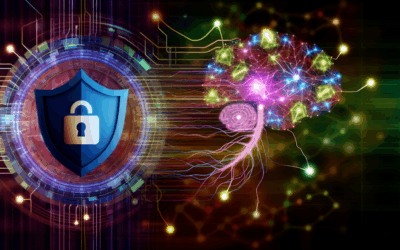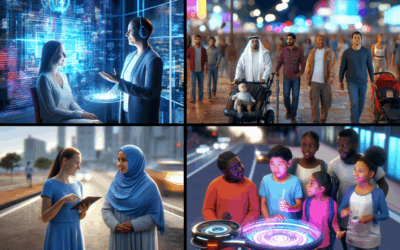Understanding the AI Landscape: Current Trends and Innovations
The artificial intelligence landscape is rapidly evolving, driven by significant advancements in machine learning, natural language processing (NLP), and computer vision. In 2023, key trends highlight the integration of AI technologies across various sectors, reshaping industries such as healthcare, finance, marketing, and automotive.
Machine learning continues to dominate, with innovations in algorithms allowing for better predictive analytics and automation. For instance, in healthcare, AI-driven tools are being deployed for early diagnosis and personalized treatment plans, significantly improving patient outcomes. AI’s ability to analyze vast amounts of data helps in identifying patterns that would be invisible to human analysis [Source: Nature].
Natural language processing is enhancing customer interactions through chatbots and virtual assistants, driving efficiency in customer service and engagement. Companies are leveraging NLP to create personalized experiences and gather insights from customer feedback, resulting in more targeted marketing strategies and improved user satisfaction [Source: Farmonaut].
Computer vision developments are fostering advancements in automation across multiple fields. In retail and automotive industries, for example, computer vision technologies are used for inventory management and safety enhancements. These systems can recognize images, analyze visual data, and assist in decision-making processes, thus streamlining operations and reducing costs [Source: PV Magazine].
In summary, AI technologies are not only enhancing operational efficiencies but also transforming business models across industries, positioning companies to better serve their customers in an increasingly competitive landscape.
The Role of AI in Everyday Life: Transforming Personal and Professional Experiences
AI has become integral to both our personal and professional lives, dramatically enhancing productivity and convenience. One of the most visible applications of AI is in smart home devices, which utilize machine learning algorithms to automate tasks such as lighting, heating, and security. For instance, smart thermostats like the Nest Learning Thermostat adapt to user behavior, learning their schedule and preferences to optimize energy consumption and provide comfort—all while reducing energy costs [Source: Nature].
In workplaces, AI-powered virtual assistants such as Microsoft’s Cortana or Google Assistant streamline schedules, manage emails, and even facilitate virtual meetings, leading to increased efficiency. These tools are designed to handle repetitive tasks, allowing employees to focus on more strategic activities that require human creativity and problem-solving skills. Reports indicate that organizations implementing AI solutions can experience productivity gains of up to 40%, as these tools effectively analyze data trends and support real-time decision-making [Source: PV Magazine].
Moreover, AI applications in sectors like agriculture illustrate its far-reaching benefits. Advanced cloud computing and IoT integrations enable farmers to monitor crops in real-time through AI-generated insights, enhancing resource management and operational efficiency. This integration of AI not only supports productivity but also fosters sustainable practices in various industries [Source: Farmonaut].
Overall, the infusion of AI into our daily routines offers not just convenience but also a significant boost in productivity, transforming how we live and work.
Ethical Considerations in AI Development: Navigating Responsibility
The rapid advancement of artificial intelligence (AI) technology has raised significant ethical considerations that developers and organizations must navigate responsibly. Key areas of concern include accountability, algorithmic bias, and the wider societal impacts of automation.
Accountability in AI development involves establishing clear lines of responsibility for AI behavior and outcomes. As AI systems make decisions that can affect individuals’ lives, the quest for accountability becomes paramount. The inability to attribute responsibility can hinder trust in AI solutions and create significant challenges in liability when harmful decisions occur [Source: Nature].
Algorithmic bias poses another ethical challenge, as AI systems can perpetuate or even exacerbate existing inequalities if not properly managed. This bias can stem from various sources, including biased training data or flawed algorithm design, and can lead to discriminatory outcomes in areas like hiring, lending, and law enforcement. Addressing this issue requires diverse datasets and inclusive development practices to ensure fairness and equity in AI applications [Source: PV Magazine].
The societal impacts of automation are profound, particularly in the labor market. While AI can enhance efficiency and productivity, it also poses risks of job displacement across various sectors. Striking a balance between leveraging AI for economic growth and ensuring the workforce is prepared for changes is essential for sustainable progress [Source: Farmonaut].
To foster responsible AI practices, industry stakeholders must collaborate on ethical guidelines, engage in public discourse, and invest in education and reskilling initiatives. By prioritizing these considerations, we can promote sustainable AI development that benefits society as a whole.
Future Predictions: What Lies Ahead for AI Technologies?
Over the next decade, AI technologies are set to evolve significantly across multiple sectors, including advancements in autonomous systems, the democratization of AI, and substantial shifts in job markets.
Advancements in Autonomous Systems
Experts predict that autonomous systems will become increasingly refined and pervasive. According to a report from Nature, the integration of AI with robotics will enhance capabilities in areas such as transportation and logistics. Self-driving vehicles and drones are expected to operate safely in complex environments, revolutionizing industries from delivery to agriculture. Innovations in machine learning algorithms combined with enhanced sensor technologies will drive these advancements forward, enabling real-time decision-making and autonomous operation with minimal human oversight.
Democratization of AI
As AI becomes more accessible, we are likely to see a democratization of technology, wherein smaller businesses and individuals can harness AI tools without extensive resources. The proliferation of open-source platforms and low-code/no-code solutions will empower a broader array of stakeholders to implement AI solutions tailored to their needs. For instance, tools that facilitate AI integration into everyday applications will emerge, as referenced by the insights shared in PV Magazine. This push towards democratization is aimed at fostering innovation and competition, allowing anyone to leverage AI for varied applications, thus accelerating societal advances.
Job Market Changes
The AI revolution is also poised to cause significant disruptions to the job market. While new positions in AI development and maintenance are expected to arise, traditional roles in sectors such as manufacturing and customer service may be jeopardized. A study from Farmonaut suggests that sectors integrating AI technologies will experience a demand for skills that complement these systems, leading to a transformation in workforce requirements. Workers will increasingly be expected to adapt to new roles that require collaboration with AI systems, focusing on creativity, problem-solving, and interpersonal skills that machines cannot replicate.
Overall, the evolution of AI technologies over the next decade will be marked by significant transformations in systems, accessibility, and employment, shaping not only industries but also the nature of work itself.
The Road Ahead: Preparing for an AI-Driven Future
As we move into an era increasingly dominated by artificial intelligence, both individuals and organizations must adopt specific strategies and skills to thrive. Here are key actionable insights:
- Develop AI Literacy: Understanding the basics of AI technology is essential for all professionals. Online courses and certifications can help build this foundational knowledge. Resources like Coursera and edX offer courses that cover AI concepts, applications, and ethical implications, making it accessible regardless of your field.
- Embrace Lifelong Learning: The rapid evolution of AI requires a commitment to continuous education. Following industry trends and advancements in AI can be achieved through webinars, podcasts, and publications like PV Magazine, which discusses emerging technologies and their implications.
- Focus on Soft Skills: As AI takes over routine tasks, skills such as critical thinking, creativity, and emotional intelligence will be increasingly valuable. Developing these skills can help individuals work effectively alongside AI tools, enhancing innovation and problem-solving capabilities in the workplace.
- Collaborative Technologies: Using collaborative platforms and tools that integrate AI capabilities can improve efficiency. Businesses should invest in technologies that facilitate teamwork and streamline processes, as seen in sectors utilizing cloud computing for data management—essential for integrating IoT and AI into daily operations (Farmonaut).
- Portfolio Diversification and Networking: For professionals, diversifying your skill set beyond traditional boundaries is crucial. Networking with peers in AI-focused communities can uncover opportunities and insights that help enhance career prospects. Engaging with platforms like LinkedIn can facilitate these vital connections.
- AI Ethics and Governance Understanding: Understanding the ethical implications of AI technology is essential for responsible adoption. Organizations should implement governance frameworks that address bias, transparency, and accountability to ensure ethical AI deployment.
- Resilience and Adaptability: The AI landscape is continuously changing; cultivating an adaptable mindset will help individuals and organizations respond effectively to new challenges and opportunities. By fostering a culture of agility, businesses can pivot quickly in the face of disruption.
Preparing for an AI-driven future demands a proactive approach integrating continuous learning, technological investment, and a focus on essential human skills. Organizations willing to embrace this shift can maintain a competitive edge as the landscape evolves.
For more in-depth exploration of AI skills and strategies, check out our articles on emerging technologies and cloud computing in agriculture.



